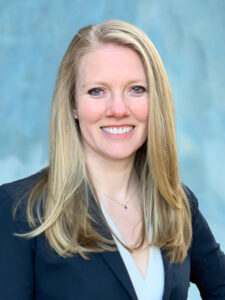 Elizabeth Gleeson, MD, MPH joined the UNC Department of Surgery as an Assistant Professor in the Division of Surgical Oncology. She discussed the draw of UNC’s cancer and epidemiologic research, as well as providing evidence-based care to the people of North Carolina.
Elizabeth Gleeson, MD, MPH joined the UNC Department of Surgery as an Assistant Professor in the Division of Surgical Oncology. She discussed the draw of UNC’s cancer and epidemiologic research, as well as providing evidence-based care to the people of North Carolina.
Dr. Elizabeth Gleeson received her undergraduate degree from Rice University, followed by a Master in Public Health and Tropical Medicine at Tulane University School of Public Health. Her medical training includes Doctor of Medicine from Tulane University School of Medicine, Residency in General Surgery at Drexel University College of Medicine, and Fellowship in Complex General Surgical Oncology, Icahn School of Medicine at Mount Sinai.
What brought you to the Department of Surgery at UNC?
I was drawn to apply for a position at UNC because of the robust cancer and epidemiologic research that is conducted at UNC. The Lineberger Cancer Center has excellent resources to help people across the state of North Carolina, and I was very impressed with the people who work here. I find that everyone is devoted to the mission of the Cancer Center and helping the institution achieve its goals of reducing morbidity and mortality of cancer and cancer-related illness in North Carolina. This mission aligns very closely with my research and my goals as a surgical oncologist. And it is really nice to work in an environment where everyone is striving for the same goal.
What are your contributions to your specialty and your goals while at UNC Surgery?
A lot of my research is within the space of quality and safety. The types of surgeries I perform are major operations and have potential for complications. My research has identified areas of improvement and ways to reduce these complications. I would like to further that research here to improve outcomes after major cancer surgery.
If you could pick the brain of someone alive or dead, who would it be?
Marie Curie. Well, really, any woman, woman of color, or minority person who has fought adversity to become a leader in science and medicine. The list of people that comes to mind is, again, Marie Curie, Rosalind Franklin, Jane Wright and Helen Taussig.
What profession did you want to be when you were a kid?
I always thought I would be a scientist. I loved science and my parents bought me a microscopy that used a mirror at the bottom instead of an electrical light source. I would look at anything I could get my hands on under magnification. In fact, I went to college thinking I would make biologic therapies. Biologics had just been approved for my mother’s arthritis, and I thought it would be great to create biologics for cancer or other diseases.
What inspired you to become a doctor?
Well, as I studied biochemistry and cell biology, I really felt that I would want more patient contact instead of being in a lab. I enjoyed the connections I made while volunteering in the hospital and on medical volunteer trips. So I started looking into medical school.
Why did you become a cancer surgeon?
In medical school, I enjoyed how problems were solved very quickly with surgery. I felt instant gratification and liked using my hands. As I progressed into surgery residency, I felt more connected to cancer patients. I found my patients to be incredibly brave and often excellent researchers! And I liked the discussion in clinic with them the most.
What is one thing you wish your patients or coworkers knew about you before they meet you?
I want to provide evidence-based care that is tailored to my patients’ needs. My goal is to provide the options and help my patients and their families decide what the best course of action should be for them.
What might someone be surprised to know about you?
I ran Division I Track and Field and Cross Country in college. It was an incredibly humbling experience, but I made amazing friendships along the way and developed a mentality that has helped me in other aspects of life. Running requires a lot of perseverance and grit, which have helped me achieve my goals, academically, as well as persevere through long operations.
Do you have any pre-surgery ritual?
Mostly, just to make sure I get a hardy breakfast. My cases can be long, and I treat surgery like I would a track and field event. I always try to do my best. In order to do that I need good rest, hydration and fuel.
If you give your younger self one piece of advice what would it be?
There will always be challenges and adversity. A coach of mine used to say, “You need to feel uncomfortable in order to improve.” And I think that is so true. Our challenges help us to grow and become better people. I would say: try to see challenges as opportunities.
What do you do when you aren’t working?
I love exercise, particularly running. Getting outdoors and hiking is such a great way to find peace of mind after a long week. I have a dog and so getting him out to exercise is a win-win as well!
For more information about Dr. Gleeson, check out her UNC Surgery faculty profile or UNC Health Care profile
